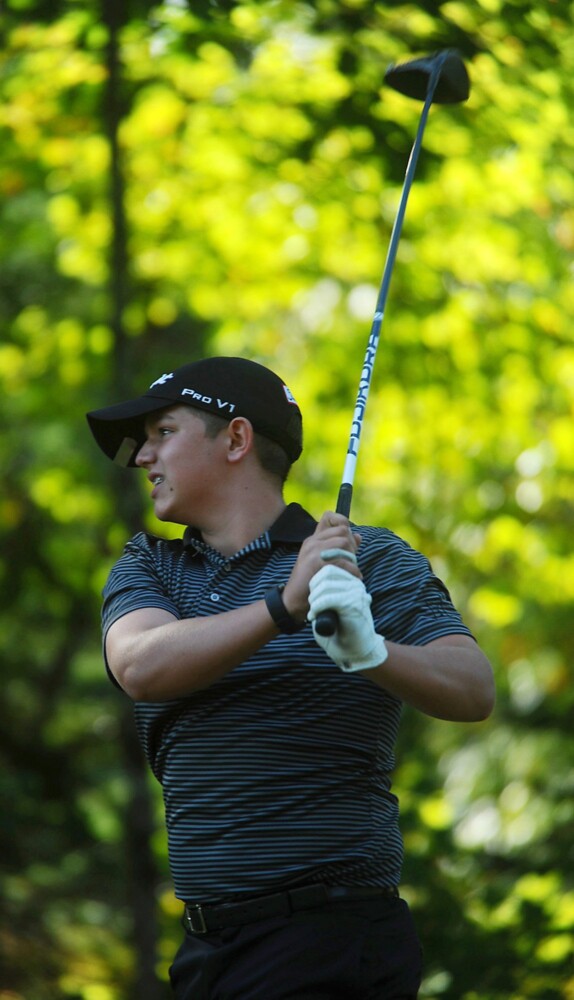The high school golf season saw its first matches on Sept. 21. And on Oct. 10, the season came to a close.
That’s the nature of playing golf in Maine. Throw in a pandemic, however, and an already short season felt even more like a sprint.
“It felt very fast,” Waterville coach Khristian Clement said. “It started late, and it was like a whirlwind. I didn’t feel like we got as much practice time as normal. It was over before I knew it.”
Unlike the other fall sports, however, it ended with championships. Conference and state meets and qualifiers went on like normal, and teams like Class A champion Greely, Class B champion Freeport, Kennebec Valley Athletic Conference Class A champion Mt. Ararat and Mountain Valley Conference champion Monmouth got to bring back hardware the way they would if this were a normal fall.
According to the players in those tournaments, having that opportunity was a victory in itself.
“It added so much,” said Cony’s Bobby Stolt, who qualified individually along with teammates Kyle Douin and Quincy Tobias. “It made us look forward to going out and playing golf, because we knew that we were competing for something that was much bigger than just us, and we weren’t out there just to have fun. We did have fun, but we were competing.”
There was more normalcy to golf than to the other fall sports, but there were some differences to which players and coaches had to adjust. As the first sport to get started, golfers had to get used to social distancing and mask rules on the course.

Erskine Academy’s Kate Bourdon follows through on a shot during the Kennebec Valley Athletic Conference championships Oct. 6 at Natanis Golf Course in Vassalboro. Andy Molloy/Kennebec Journal file photo
“It was different for different associations,” said Maine Central Institute freshman Owen Moore, who tied for second place in the Class B tournament. “Some tournaments required you to wear a mask during the round (before swinging) … and others said you don’t need to wear it if you’re playing. … It took a couple of times to get used to.”
Players also had to adjust to playing without family and on-lookers allowed on the course, and many had to do it in matches that, due to pod scheduling, were against the same two teams all season. The biggest practical effect, though, came from the shorter season, which made it more difficult for players who didn’t play during the summer to find their games in time, and for players outside the match ladder to get practice time.
“It definitely was compact,” Erskine coach Mark Bailey said. “I had probably 12 players, but almost every day of the season we were only able to bring six. I had six of my newcomers basically not being able to get out on the golf course, because we were constantly in a match at home or away.”
The players who were only in-season golfers were affected the most, but even spring and summer players had less time to shake off slumps.
“We didn’t really have the time to get into the swing of things as a team,” Waterville’s Pete Sack said. “We had to really clean up really quick, and go out there and do the best we could.”
The opportunity to play in state championships, however, made up for all the drawbacks and differences. Players and teams from all over the state still descended upon Natanis Golf Course for conference and state championships, which gave the golfers their biggest incentive for playing.
“It would have been pretty upsetting (without them). We wouldn’t have really had something to look forward to as a team, to make ourselves better,” said Sack, who shot 83 to help Waterville tie for second in Class B. “I don’t think people would have put as much effort in as they did.”
“For us, it was huge, especially based on how the regular season was set up,” Clement said. “The fact that they were still able to have our qualifiers and see how well we could do against all of the teams in our conference, as kind of a tune-up for the state championships, that made the season for us.”
For Bailey, the championships were a bonus. The chance to play, after a wiped-out spring, was the real prize.
“It was as fulfilling as ever,” he said. “I had a bunch of kids that had their spring season taken away from them. If we had played one match, I think they would have been feeling a lot better than they did last spring.”
Comments are not available on this story.
Send questions/comments to the editors.



